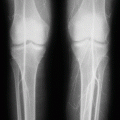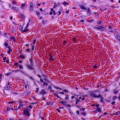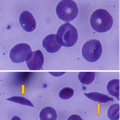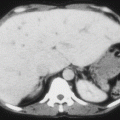(1)
Department of Surgery, Dar A lAlafia Medical Company, Qatif, Saudi Arabia
9.1 Introduction
Sickle cell anemia is one of the most common inherited hemoglobinopathies worldwide.
Painful vaso-occlusive crisis is the leading cause of emergency room visits and hospitalization of these patients.
These attacks commonly affect the skeletal system and can be localized or generalized affecting more than one site of the body.
Abdominal pain is an important part of these painful attacks.
It can occur in isolation or more commonly as part of a generalized vaso-occlusive crisis.
Other sickle cell anemia-related abdominal complications that may be present with abdominal pain include:
Cholelithiasis with or without cholecystitis
Choledocholithiasis with or without cholangitis
Acute splenic sequestration crisis
Splenic infarction
Splenic abscess
Acute pancreatitis
Peptic ulcer disease
Acute appendicitis
Hepatic infarction
Hepatic abscess
Ischemic colitis
Hepatic crisis
Mesenteric lymphadenitis
9.2 Abdominal Vaso-Occlusive Crisis
This is one of the causes of acute presentation of patients with sickle cell anemia.
It can present in isolation or more commonly as part of a generalized vaso-occlusive crisis.
Abdominal pain due to sickle cell vaso-occlusive crisis often represents a diagnostic challenge as it is often indistinguishable from other causes of acute abdomen.
It is estimated that approximately 10 % of patients with sickle cell anemia are admitted to the hospital each year due to acute abdominal pain.
These episodes of abdominal vaso-occlusive crisis are often attributed to microvessel occlusion and infarcts of the mesentery and abdominal viscera. This causes severe abdominal pain and signs of peritoneal irritation, and abdominal X-ray often shows a generalized ileus (Figs. 9.1 and 9.2).
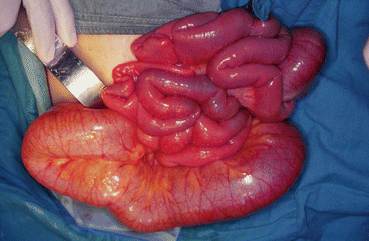
Fig. 9.1
Intraoperative photograph of a child with abdominal vaso-occlusive crisis. Note the congestion and ileus of the affected bowel which is slightly dilated
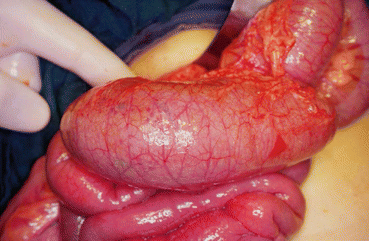
Fig. 9.2
Intraoperative photograph of a child with abdominal vaso-occlusive crisis. Note the dilated small intestine and also small areas of hemorrhage in the bowel wall
Other causes of abdominal pain in patients with sickle cell anemia include bone marrow infarction of the vertebral bodies with nerve root entrapment, acute pancreatitis, and enlarged mesenteric and retroperitoneal lymph nodes with infarction.
In the majority of cases, however, no specific cause is identified and spontaneous resolution occurs.
The fact that many of these patients present to the emergency room with attacks of abdominal pain that resolve spontaneously should not be taken lightly in order not to miss a surgical cause. On the other hand, these patients should not be rushed to the operation room for the fear of missing an acute surgical abdomen.
It is important to evaluate these patients properly with a careful history, frequent clinical evaluations, and investigations. Patients with moderate and sever attacks of abdominal vaso-occlusive crisis should be admitted to the hospital for further evaluation and observation.
The presence of vaso-occlusive crisis at other sites of the body makes the abdominal pain part of the vaso-occlusive crisis rather than secondary to an acute surgical emergency.
The management of patients with abdominal vaso-occlusive crisis is conservative and includes:
Admission for close observation and frequent evaluation.
Nothing by mouth.
Intravenous hydration.
Investigations including CBC, electrolytes, BUN, creatinine, abdominal X-rays, and abdominal ultrasound.
Analgesics should be given once the diagnosis of acute surgical conditions was ruled out.
Packed RBC blood transfusion should be given when there is an associated anemia (Hb < 9 g/dl).
The majority of abdominal vaso-occlusive crisis attacks resolve spontaneously without the need for surgical exploration. The time interval for complete resolution is however variable.
9.3 Peptic Ulcer Disease
The exact incidence of peptic ulcer disease in patients with sickle cell anemia is not known, and there is no study documenting the prevalence of peptic ulcers in SCA.
It is estimated that one-third of patients with sickle cell anemia who present with chronic epigastric pain have endoscopic evidence of peptic ulcer (Figs. 9.3 and 9.4).
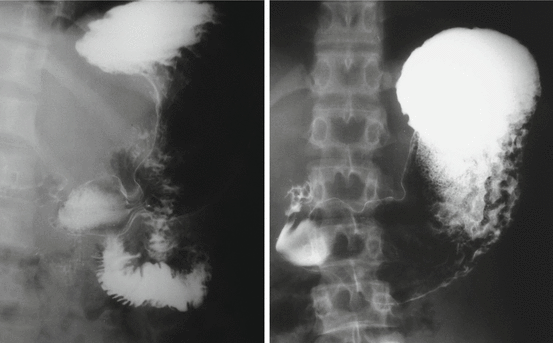
Figs. 9.3 and 9.4
Barium meal showing peptic ulcer disease in two patients with sickle cell anemia
In one study, peptic ulcer disease was found in 35 % of patients with sickle cell anemia presenting with epigastric pain.
Duodenal ulcer (27 %)
Gastric ulcer (8 %)
Stay updated, free articles. Join our Telegram channel

Full access? Get Clinical Tree




